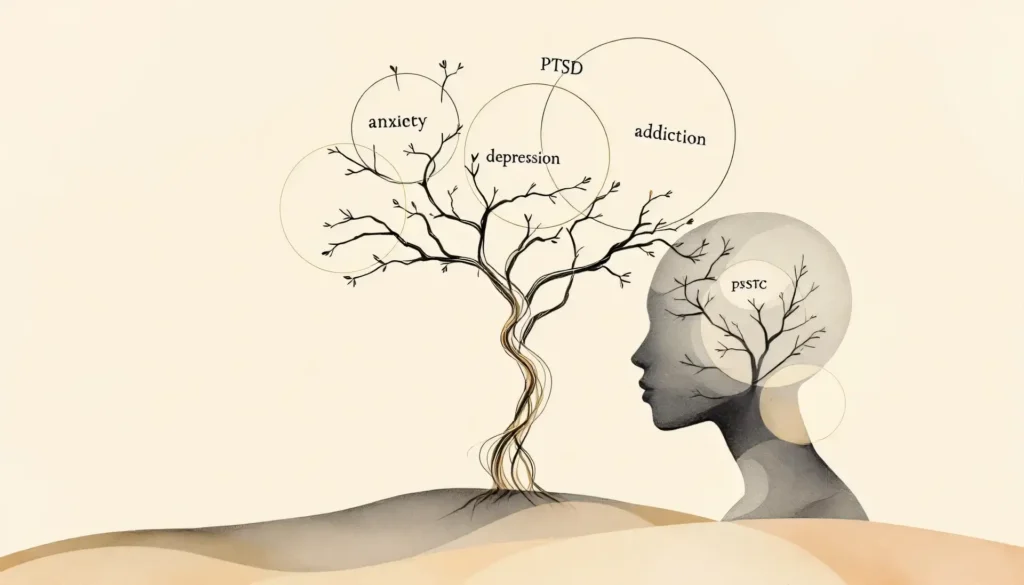Trauma-informed care is a framework that understands the lasting effects of trauma on health. It focuses on creating safe, supportive environments to aid recovery. This article explains what trauma-informed care is, its core principles, benefits, and how to implement it effectively.
Key Takeaways
- Trauma-informed care is a framework prioritizing safety, trust, and collaboration, crucial for addressing the impacts of trauma in behavioral health settings.
- Organizations implementing trauma-informed practices build supportive environments that enhance healing and recovery for both clients and staff, leading to better long-term health outcomes.
- The Rose House exemplifies trauma-informed care through its gender-specific treatment and holistic approach, effectively addressing the unique challenges faced by women in recovery from trauma and co-occurring disorders.

What is Trauma-Informed Care?
Informed care rooted in trauma awareness is an approach that acknowledges the widespread influence of trauma on both health and conduct. It’s a fundamental strategy within behavioral health aimed at fostering environments that are safe, compassionate, and welcoming for those receiving care. Grasping how trauma shapes responses is vital given that symptoms and behaviors connected to trauma typically stem from coping mechanisms developed in response to such experiences. Trauma-informed care shifts the focus from ‘What’s wrong with you?’ to ‘What happened to you?’ By weaving this understanding into organizational policies and practices, there’s better support provided for patients impacted by traumatic events.
Adopting this framework necessitates a shift at the organizational level which encompasses adopting precautionary measures regarding trauma universally while also paying attention to matters of diversity, equity, inclusion, accessibility, and justice. Acknowledgment of these aspects empowers healthcare providers to cultivate spaces conducive to nurturing healing and facilitating recovery processes. Trauma-informed organizations work to eliminate policies and practices that might traumatize clients. The principles underlying informed procedures sensitive to traumas clarify the manner in which this method takes shape when put into practice.
Core Principles of Trauma-Informed Care
The principles at the core of trauma-informed care include safety, trustworthiness, choice, collaboration, and empowerment. Safety is paramount, ensuring a secure environment both physically and psychologically for patients and staff. Trust is built through transparent decision-making and fostering connections, often with the help of peer support.
Collaboration between patients and providers in treatment planning promotes shared decision-making and empowers patients by fostering a belief in their resilience and capability to heal. Culture responsive practices and recognizing biases are also vital in trauma-informed care, increasing the likelihood of successful outcomes.
Supervision and consultation for providers help them understand their responses to clients, promoting effective trauma-informed practices. These principles create a supportive environment where those who have experienced trauma can begin to heal. Additionally, trauma-informed care can help reduce burnout among healthcare providers by fostering a more supportive and understanding workplace culture.
Benefits of Trauma-Informed Care
Patients receiving trauma-informed care often experience better long-term health outcomes. Facilities like The Rose House cater to women’s unique needs, creating safer environments that enhance their recovery from trauma and co-occurring disorders. Gender-specific treatment centers promote comfort and trust among women, significantly improving treatment outcomes. Women-only treatment environments are designed to address unique challenges faced by women, leading to better overall recovery rates.
Research indicates that women participating in gender-specific treatment programs often experience improved outcomes when dealing with trauma and co-occurring disorders. Implementing trauma-informed practices can lead to improved engagement and trust in the trained provider-patient relationship.
The benefits of trauma-informed care are clear, making it a vital approach in behavioral health services.
The Role of Trauma-Informed Organizations
Organizations that adopt trauma-informed care are pivotal in establishing support networks that aid in the healing process for both clients and staff members. It’s crucial for these organizations to assess their practices, confirming they align with a trauma-informed approach and contribute positively rather than impede it. Implementing trauma-informed services can improve treatment planning, decrease the risk of retraumatization, and enhance communication between clients and providers. When such informed care protocols are put into practice, they help build stronger trust between clients and those serving them, fostering an atmosphere more conducive to recovery.
Embracing a trauma-informed method requires an organization to ensure its environment is not only secure but also optimized for facilitating healing processes. To evolve into a truly trauma-informed organization requires concerted dedication and commitment across all tiers of the entity’s structure.
Steps to Becoming a Trauma-Informed Organization
Core principles of trauma-informed organizations include:
- Safety
- Trust
- Transparency
- Collaboration
- Mutuality
- Empowerment
- Choice
Effective implementation of trauma-informed care requires ongoing administrative support and commitment at all levels. Effective trauma-informed care also requires cooperation among different behavioral health service providers and mental health services administration to ensure comprehensive treatment.
Organizations must adhere to trauma-informed values and principles systematically over a minimum of three to five years, which includes the assessment of trauma awareness to recognize trauma. Screening for trauma histories and experiences is important for providing trauma-informed services. Ongoing support involves connecting clients with community resources to aid in sustained recovery.
Following these steps helps organizations create an environment conducive to trauma-informed care.
Creating a Safe Environment
Implementing trauma-informed care requires a comprehensive approach across an organization, which includes adopting effective policies and establishing both physical and emotional safety. Overlooking the role of trauma in treatment can greatly impede an individual’s prospects for sustained recovery. Encouraging clients to recognize their support systems enables them to pinpoint available resources that aid their healing process.
Adopting a trauma-informed perspective can substantially enhance recovery outcomes for individuals receiving therapy. At The Rose House, we foster a family-like atmosphere by offering secure spaces tailored to specific genders along with incorporating whole-person care strategies into our treatment programs.
Showcasing case examples where trauma-informed care has been beneficial serves as testament to its far-reaching effects on the wellbeing of those who engage with such services.

Trauma-Informed Care at The Rose House
The Rose House is dedicated to offering a nurturing environment tailored for women, aimed at addressing and overcoming their trauma while promoting healing. Central to this mission is the establishment of a secure and compassionate space, deemed vital in the successful recovery from traumatic experiences. The emphasis on trauma-informed care significantly contributes to improving participation in treatment and advancing psychological recuperation among female clients.
At The Rose House, there’s an implementation of specialized trauma-informed practices designed with the distinct emotional and mental needs of women in mind. This institution stands out as one of the few exclusive residential facilities for women dealing with mental health conditions and substance abuse issues across Colorado and nationwide. Thus providing an ideal setting for those seeking assistance with trauma-related mental health concerns. At The Rose House, we go above and beyond trauma informed care, and truly provide trauma focused treatment.
Comprehensive Treatment Approach
At The Rose House, a holistic approach to treatment is paramount. It encompasses a blend of individual therapy, group interactions, hands-on experiential therapies, and the careful oversight of medications. This extensive strategy incorporates diverse therapeutic techniques which prioritize holistic practices that address not only psychological and emotional wellness but also physical healing along with spiritual and cognitive development.
The creation of personalized treatment plans for each woman at The Rose House stems from thorough evaluations tailored to her specific life context. By centering on the distinctive requirements of each woman, The Rose House guarantees top-tier care custom-fitted for her pathway towards recovery.
Gender-Specific Treatment Benefits
Recovery centers designed for women and gender-specific therapeutic approaches yield improved results due to the nurturing and trustworthy atmospheres they cultivate. By catering specifically to the distinct hurdles that women encounter, these settings contribute to enhanced rates of successful recovery. The Rose House’s approach is structured around creating a space of increased comfort and safety, which in turn markedly elevates treatment effectiveness for individuals grappling with trauma as well as concurrent psychological conditions.
At The Rose House, there is an emphasis on addressing the specific emotional and mental health challenges faced by women. It establishes a compassionate setting conducive to healing by employing strategies rooted in trauma-informed care tailored explicitly for this demographic. This method demonstrates its merit through heightened rehabilitation achievements recognized within such gender-focused therapy establishments.

Addressing Trauma and Co-Occurring Disorders
Undergoing a traumatic event can severely complicate an individual’s mental health, especially for those who are simultaneously battling substance use disorders. Exposure to trauma is often found at the root of these disorders and has been known to amplify the symptoms of existing mental illnesses. Enduring long-term consequences such as adverse childhood experiences and toxic stress may result in persistent physical and behavioral health issues that detrimentally affect both one’s physical state and psychological well-being.
To effectively address this intricate relationship between trauma exposure, mental illness, and substance abuse, it is crucial to employ integrated treatment approaches. Overlooking the role of trauma during treatment processes markedly diminishes chances for individuals achieving lasting recovery.
Specifically catering to women’s needs in this area, The Rose House offers specialized care designed to foster emotional healing alongside focusing on treating their psychological afflictions – all through a lens sensitive to past traumas they might have experienced.
Dual Diagnosis Treatment
Nearly 9 million people in the U.S. are affected by dual diagnosis annually. Women often experience more pronounced and complex symptoms of dual diagnosis, making specialized treatment crucial. Dual diagnosis refers to the presence of both substance abuse and mental health conditions simultaneously. The Rose House specializes in treating addiction, primary mental health issues such as trauma and PTSD, co-occurring disorders, dual diagnosis, and mental health services.
The Rose House employs a variety of evidence-based therapies, including Cognitive Behavioral Therapy (CBT), EMDR, and Prolonged Exposure Therapy tailored to women’s individual trauma experiences. Holistic methods like art therapy and equine therapy enhance emotional expression and support healing.
Sustained recovery often involves ongoing training therapy, providing clients with tools to maintain stability and prevent relapse.
Process Addictions and Trauma
Behavioral addiction, otherwise known as process addiction, involves the relentless participation in rewarding activities that do not involve substances but still lead to detrimental consequences despite these short term pleasure effects.
Activities commonly associated with behavioral addictions are:
- engaging in gambling
- indulging excessively in shopping
- compulsive sexual behaviors
- disordered eating patterns
- excessive technology, social media and internet use
It is essential to address concurrent disorders and offer treatment tailored specifically for women to successfully facilitate their recovery from behavioral addictions.
Frequently occurring mental health issues tied to substance abuse among women include:
- Disorders involving anxiety
- Disorders affecting mood
- Clinical depression
- Traumatic stress post incident (PTSD)
- Bipolar disorder spectrum
- Self Harm and suicidal ideation
Addiction related to food manifests through unmanageable eating behaviors such as overeating or restricting food intake, often connected with emotional turmoil where individuals might rely on food as a strategy for coping.
The Rose House adopts an approach centered around treating trauma and provides comprehensive care designed exclusively for women dealing with behavioral addictions.
Empowering Women Through Trauma-Informed Care
Treatment that is trauma-informed emphasizes the empowerment of women, enhancing their resilience and encouraging self-care practices. This approach allows for a deeper understanding of trauma histories, enabling women to begin a journey towards healing that supports personal development and recovery.
The Rose House serves as a model for this method by providing an environment conducive to supporting women in their healing process, ensuring they have the resources needed to prosper.
Building Resilience
At The Rose House, clients are introduced to mindfulness practices that aid in fostering resilience and regulating emotional reactions. It’s essential for these individuals to recognize their own strengths, which significantly contributes to their capacity for resilience. Techniques from cognitive-behavioral therapy also play an important part in this process by aiding clients in reframing traumatic events and devising strategies to cope with them.
Offering personalized support while maintaining a deep understanding of trauma can markedly improve the healing journeys of women who come through The Rose House. Through education on advanced techniques for managing emotions, women learn how to better navigate through their personal experiences with trauma toward recovery.
By nurturing resilience within its clientele, The Rose House is committed to helping women triumph over past traumas and carve out hopeful futures for themselves.
Long-Term Support and Aftercare
At The Rose House, continuous assistance is specifically crafted to bolster recovery and reduce the likelihood of relapse following primary treatment. As a segment of its intensive outpatient program, The Rose House furnishes structured environments that are both healthy and free from substances to aid in preserving enduring sobriety and averting relapse. It’s imperative for clients to establish a consistent routine as it delivers stability which can help deter relapse.
Providing sustained support along with aftercare services assures that women possess the necessary resources and counsel required for sustaining their journey towards recovery at The Rose House. Such ongoing backing is vital in realizing sustainable sobriety as well as overall well-being.
Summary
Trauma-informed care embodies a transformative approach that acknowledges the significant influence trauma has on health and behavior. Organizations such as The Rose House are pioneers in utilizing trauma-informed practices within their behavioral health services to cultivate environments conducive to safety, support, healing, and recovery. Adhering to the essential core principles of trauma informed care—safety, trustworthiness, choice, collaboration, and empowerment—is crucial for fostering long-lasting positive health outcomes and strengthening the relationship between healthcare providers and their patients.
At The Rose House specifically, there’s an illustration of how effective trauma-informed care can be through its comprehensive treatment strategies tailored for women. By concentrating on both traumatic experiences and concurrent disorders while bolstering resilience in women alongside offering ongoing assistance ensures these individuals have access to necessary resources for continual recovery. Grasping this understanding coupled with implementing informed practices stands as a beacon of transformational change. It presents those who’ve endured trauma with new prospects laden with hopefulness towards healing paths.
Frequently Asked Questions
Trauma-informed care is a framework that acknowledges the widespread effects of trauma on individuals, promoting safe and inclusive environments while integrating trauma awareness into health practices.
This approach is essential for effectively supporting those who have experienced trauma.
The core principles of trauma-informed care are safety, trustworthiness, choice, collaboration, and empowerment, all aimed at fostering a supportive and healing environment for individuals with trauma histories.
Implementing these principles is essential for effective trauma care.
Trauma-informed care leads to better long-term health outcomes, increased trust between patients and providers, and enhanced treatment engagement.
This approach, particularly in gender-specific environments, significantly supports recovery, especially for women.
The Rose House implements trauma-informed care by employing a holistic treatment model that includes individual and group therapy, experiential therapies, and medication management, all tailored to create a supportive environment for women facing unique emotional and psychological challenges.
This approach fosters healing and resilience among its clients.
Furthermore, The Rose House does not just apply trauma informed care principles – they take informed care to the next level by actually treating the underlying trauma directly, versus simply being mindful that individuals have experienced trauma.
Treatment for dual diagnosis is critical because it provides combined methods to successfully tackle both substance use and mental health disorders.
By acknowledging the intricate connection between these issues, this holistic strategy promotes a more effective recovery process.
Sources:
NIH.gov: Trauma-Informed Care in Behavioral Health Services







